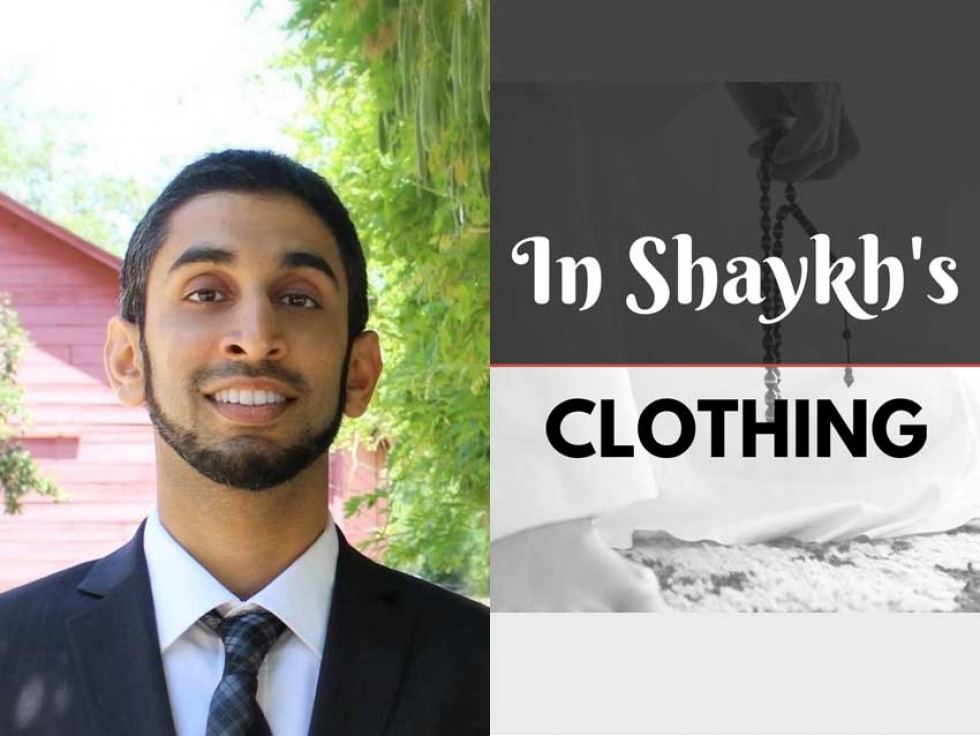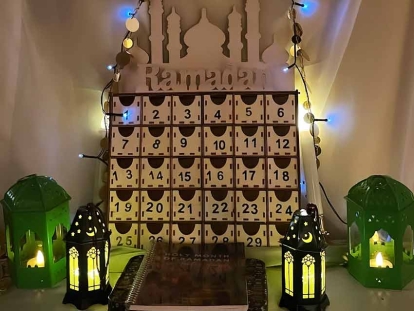 Danish Qasim is the founder of "In Shaykh's Clothing", an initiative supporting victims of spiritual abuse within North American Muslim communities.
Danish Qasim is the founder of "In Shaykh's Clothing", an initiative supporting victims of spiritual abuse within North American Muslim communities.
Dec
In Shaykh's Clothing: Supporting Muslim Survivors of Spiritual Abuse
Written by Chelby Daigle"In Shaykh’s Clothing" is an initiative that has been set up to support victims of spiritual abuse within North American Muslim communities.
Muslim Link interviewed the founder of "In Shaykh’s Clothing", Danish Qasim, about the work of “In Shaykh’s Clothing.”
1. Tell us about yourself
My name is Danish, I’m from Hayward, California. I began a serious study of Islam while I was in college, and then studied full time after graduation. Most of my overseas studies have been in Mauritania. I’m now in graduate school with spiritual abuse as my focus.
2. How has your field of study informed your work with "In Shaykh's Clothing"?
My foundation is actually in spiritual abuse, but my studies have opened the door to other areas, namely work place bullying, sports bullying, and speaking at cult studies conferences.
I used to only make Islamic arguments against spiritual abuse. While people would accept the statements, they could not apply it to the abuse even when experiencing it. All Islamic evidence would be viewed as ‘one view’ and there would be an assumed ‘difference of opinion’ that they say the teacher must be employing. Effectively, religious arguments were completely ignored. I knew I had to find a different way to talk about spiritual abuse. I began doing research on manipulation, cults, and narcissism. That gave me new ways to address spiritual abuse in a more effective way.
3. How would you define "Spiritual Abuse"?
Spiritual abuse is using religion for personal gain or to harm others. Spiritual abuse is its own general category of offenses that encompasses other specific offenses such as financial misappropriation, secret marriages, bullying, sexual assault, molestation, exploitation, manipulation, and psychological harm.
‘Spiritual abuse’ is the term we went with to address age-old religious abuse because it is already an established term. This includes concepts such as طلب الدنيا بالدين talab al-deen bi al-dunya, seeking the world through religion, charlatans, predators, and for recognizing their tricks. Using the comprehensive term ‘spiritual abuse’ serves a practical benefit for people searching for help. Most Muslims in need will not know of traditional concepts to search for, they just know that they are going through spiritual abuse and want help. I have received plenty of outreach just from people who searched ‘Islamic spiritual abuse’ and found "In Shaykh’s Clothing".
4. Why did you found "In Shaykh's Clothing"?
I saw a lot of spiritual abuse in my locale. This included heavy bullying, spiritual claims that sought to control followers, financial exploitation, dissemination of confidential information, blackmail, violent threats, cover-ups, ostracization (shunning), and secret marriages.
Unfortunately, some of the teachers I knew were perpetrating many of the above mentioned offenses. This caused me to break away from them, and I appealed to other teachers as well as supporters who knew all this but just did not care, especially when it came to people who were successful in dawa ((preaching Islam, particularly for the purpose of converting non-Muslims).
The pattern was as follows: Muslims would be treated terribly by these teachers, leave the ‘religious scene,’ new eager attendees replace them, and no one would care about all the people who were wronged. I began warning against these people, and as one of the only people who would actually confront them, I got a reputation as someone who could help others. Many years later I met Danya Shakfeh while we were working on a case together. She is an experienced lawyer, so our collaboration grew and that led to starting “In Shaykh’s Clothing”. As we were getting more outreach through referrals, we realized we had to address the issue at a broader scale.
I get a lot of outreach and have regular conversations with Muslims who have gone through spiritual abuse.
5. Based on your work with “In Shaykh's Clothing”, what are the most common forms of spiritual abuse that you are seeing take place within North American Muslim communities?
I would summarize it as taking advantage of sincere people. Common forms I have seen would include abusive marriages in which women are not given basic rights, often these marriages are done secretly, bullying, and financial exploitation such as religious non-profits collecting funds, misrepresenting where the funds go, and then pocketing the proceeds.
Abusers often find the most vulnerable who may be convert women who lack family support, older or single women, particularly those with kids, or young men looking for belonging.
6. Could you explain the role narcissism often places in spiritually abusive situations in Muslim communities?
Narcissism really is at the core of spiritual abuse. This includes men and women, Sunni and Shia, Sufi and Salafi. Narcissism allows one to see oneself above the rules, create exceptions for oneself, rationalize harming others, and not feel the least bit remorseful. Good causes are tools for their own self-aggrandizement.
Unfortunately it’s becoming increasingly common for some women to use the need for more female Islamic scholarship to carry out their own abuses and bullying. We should not make anyone into heroes and understand that the culture is now ripe for the same men and women who are guilty of serious abuse and cover-ups to now become advocates for spiritual abuse and be put on pedestals.
This has already happened with increased mental-health advocacy where you have many shaykhs promoting the need to understand mental health while privately mocking those with mental health issues and inducing more trauma. Some are also publicly advocating not just going to a shaykh for mental health issues- but privately say that is just for the masses, so they say to their followers that they have learned spiritual methods for curing psychological pain and can solve it because they learned these methods from their own shayukh (religious educators).
They are great readers of personalities, can manipulate people, know which emotional strings to pull to get what they want, create worlds of confusion for victims, gaslight them (gaslighting is a form of psychological manipulation aimed at making victims question their own memory, perception and sanity), and play people against one another.
Narcissists are often charismatic and very charming. This means they are often a bigger draw in terms of audiences than non-narcissists. They can make people feel great, network well, raise a lot of money for organizations at fundraisers, and are good at dawa (preaching Islam, particularly for the purpose of converting non-Muslims) just like they would be at sales. Because of how useful they are, many other teachers and organizations turn a blind eye to their abuse.
Learning how to deal with a narcissist is one of the most vital skills in dealing with spiritual abuse, and I have worked with many individuals who Alhamdulillah (Thank God) were able to have successful confrontations with their narcissistic abusers, or just make sense out of their situation and take control of it.
7. How can our community better educate itself in order to be able to identify spiritual abuse and support survivors?
Spiritual abuse is like demagoguery (speaking to people in a way that plays on their emotions and prejudices rather than on their rational side, making the one using demagoguery very popular with many people). It’s only easy to recognize when you don’t like the perpetrator. If their message or approach appeals to you, it may be very hard for you to recognize their abusive behavior or give people the benefit of the doubt if they share with you that they have been victims of abuse from these popular religious educators.
There are some basic signs such as using ‘wisdom’ and dreams to justify actions. Making a habit out of taking opinions or acting privately with students in a way they don’t want anyone else to know is another sign. There will be some obvious instances, as in the case of a shaykh of tariqa (path of spiritual learning) who has no ijaaza (a license authorizing its holder to transmit a certain text or subject, especially religious knowledge.), or who has lied about his ijaaza. In such a case, the shaykh does not need to be abusive, the lie is enough of a grounds for students to leave. But in too many cases of abusive shaykhs, the ijazas will be valid, they will have validation from their senior teachers (who often do not know the reality of what these teachers are doing) and these are all factors that make the abuse hard to recognize.
Everyone must have firm boundaries. If you find yourself confused about interactions, knowing something is wrong but can’t make an Islamic argument about what exactly, that’s a sign something is very wrong. For example, I know of teachers who would touch women on their hijabs and say “I love you” pressuring them to repeat it back. These women would be confused, and not say it back at first, but be told that “it’s not haram because I’m touching your hijab- not your skin.” They were outmatched in argumentation- but knew it was wrong. Barriers are broken step by step.
What we need is firmness in personal boundaries, and the ability to say “I don’t care if it’s halal, you can’t touch me!” There will always be people who are very vulnerable, highly susceptible to influence and suggestions, and unfortunately easy to manipulate. We cannot expect them to stand up for themselves, and must not be bystanders when we see them ridiculed or harmed.
Abusers can often count on bystander effect (a social psychological phenomenon in which individuals are less likely to offer help to a victim when other people are present) to publicly humiliate someone without any resistance. In fact, their actions will often be defended and the target blamed- or the transgression will be minimized. We must internalize that wrong is wrong no matter who does it.
We can help survivors by simply listening to them. There is a lot of built up frustration when they are ignored, told to ‘just get over it’ when nothing is done to address their actual situation. Much of my outreach consists of speaking to targets of spiritual abuse and helping them reconnect to Islam.
It’s also important we all increase our Islamic studies. If not, we are in danger of adopting a framework for abuse that is alien to Islamic standards. This is something that really troubles me in some of the spiritual abuse discourse amongst Muslims.
This would include believing that one is not able to consent to a relationship with someone in religious leadership simply because the ‘power differential’ is so great. This potentially labels a non-exploitative marriage in which religion was not used as spiritual abuse, or sinful acts of intimacy where religion was not used as spiritual abuse, and the marriage is NOT a secret. This type of logic suggests that the position of a religious figure is inextricable from his or her actions- even when religion is not explicitly or implicitly used. We are not that type of religion in the first place where we believe in a priestly class that others are supposed to submit to. So although people can use religion to manipulate others, or their positions to exploit others, in no way does the mere position one holds serve as a coercive force. That being said, people in leadership do have more accountability.
What are some misconceptions about spiritual abuse you think are important to fix?
I want people to know that this is an epidemic. It’s not just a few teachers. And most of the people who reach out to me are not looking to name perpetrators, nor are they targeting prominent figures. They just want to be able to move on with their lives. Through opening up “In Shaykh’s Clothing” as a platform for victims to seek assistance I have seen miraculous stories of abused individuals heal, regain their connection to Islam, and ultimately overcome their tumultuous experiences.
8. How can we support the “In Shaykh's Clothing” initiative?
Share the initiative widely, let people know that there are people willing to help Muslims who have been let down by their community.
You never know who has gone through spiritual abuse.
Also, if able, making a contribution online here is a great way to support.
To visit the "In Shaykh's Clothing" website, click here.
This article was produced exclusively for Muslim Link and should not be copied without prior permission from the site. For permission, please write to info@muslimlink.ca.
















